Constant weather shifts in North Texas can take a toll on swimming pools, from chemistry imbalances to damaged equipment. That’s why our team at Integrity Pools put together this seasonal pool maintenance guide to help homeowners in North Texas stay prepared year-round and keep their water safe, clear, and enjoyable.
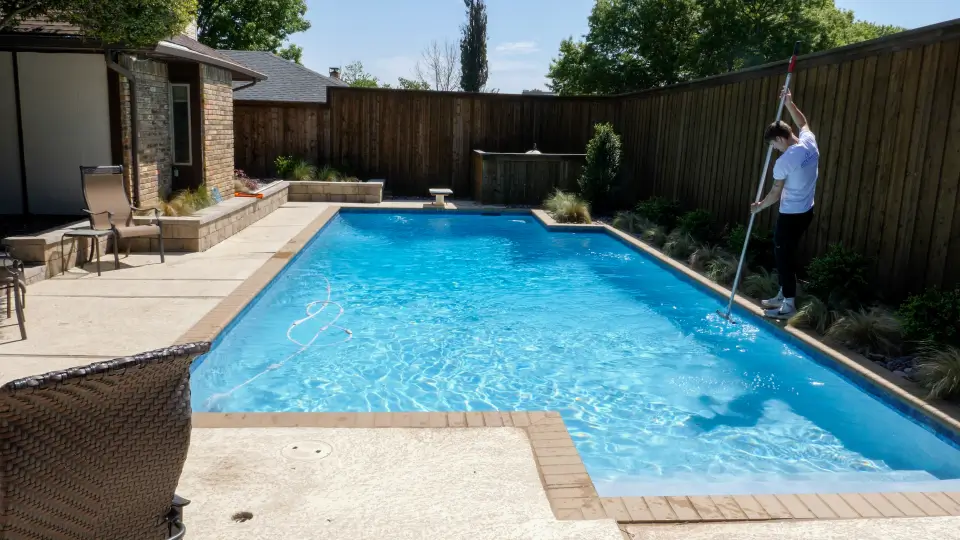
The Best Seasonal Maintenance = Regular Maintenance Year-Round
The key to avoiding costly repairs and enjoying a safe swimming environment is consistency. Pools in North Texas perform best when they’re cared for every week, not just during peak swimming season. Proper pool maintenance requires routine upkeep to keep water chemistry balanced, equipment running properly, and surfaces free of algae.
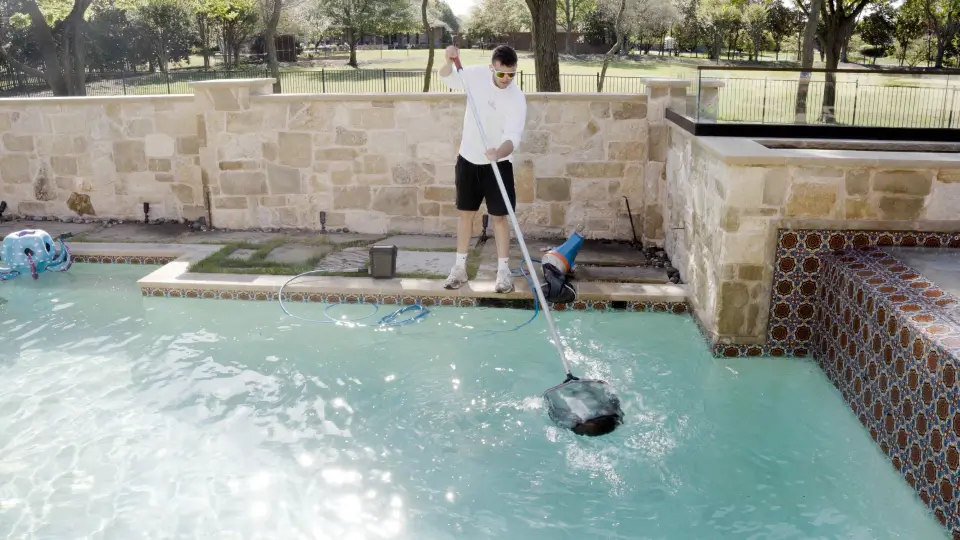
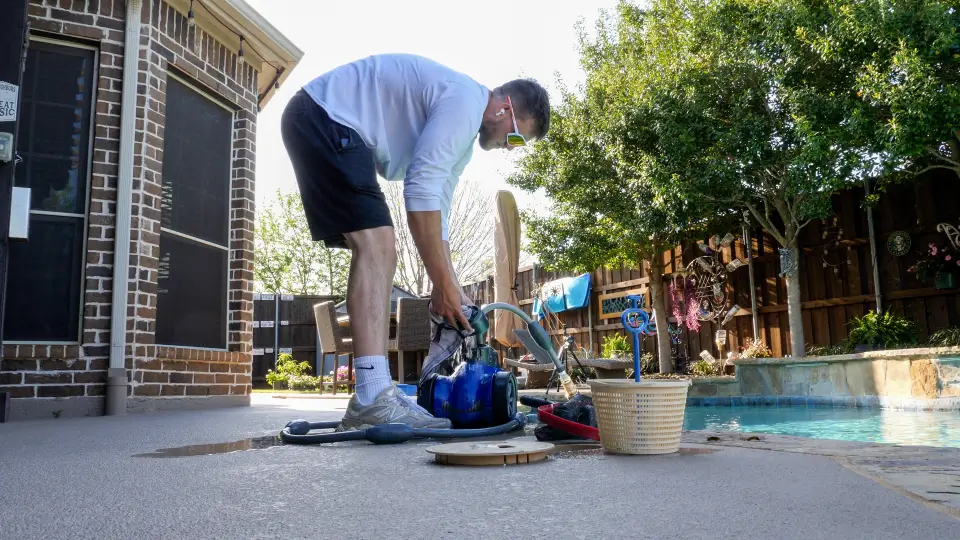
Regular Maintenance:
- Brush pool walls and floor weekly to prevent algae growth.
- Keep water circulating at least eight hours a day, even in cooler months.
- Check chlorine and water balance after storms or heavy use.
- Use pool covers to keep debris out during fall and winter.
- Schedule professional inspections before swim season and before freezing temperatures.
Maintaining Your Pool During Spring
As temperatures climb in spring, algae becomes a major concern. This is the time to test free chlorine, calcium hardness, and chemical levels more frequently. Inspect the pool equipment, including the pump, filter, and pool covers.
If water looks cloudy, a pool shock treatment may be necessary. Many pool owners ask, “Do I need to shock my pool every week?” In spring, pool shock is not always required weekly, but it’s recommended after heavy rain, storms, or high swimmer use.
Spring Maintenance:
- Test chlorine, calcium hardness, and water balance frequently.
- Inspect pump, pool filter, and pool covers for damage.
- Brush pool walls and vacuum pool floor to prevent algae growth.
- Shock the pool after storms, heavy rain, or high use.
Preparing Your Pool for Peak Swimming Season
North Texas pools see the most activity from May through August. To prepare, we recommend testing chlorine levels more often, brushing surfaces, and ensuring the pool pump and filtration system run long enough to keep water circulating. Weekly cleaning services throughout the summer help prevent algae growth, cloudy water, and unsafe chemical levels.
Summer Prep:
- Increase circulation by running pump and filter system longer.
- Brush pool surfaces and check water chemistry more often.
- Schedule weekly professional cleaning to prevent algae blooms.
- Balance chlorine levels for safe swimming during peak use.
Keeping Up With Heavy Use in Summer
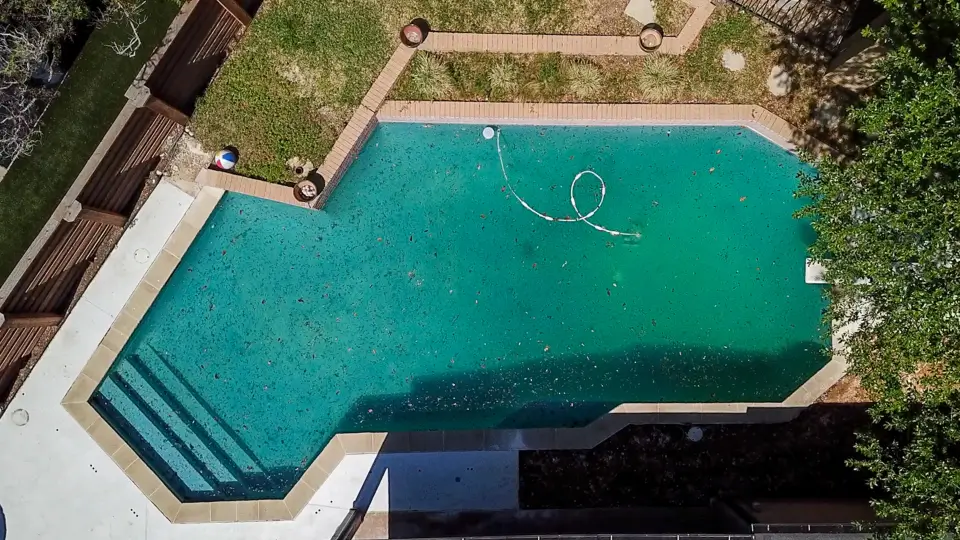
Summer heat accelerates chlorine loss, evaporation, and algae growth. Skimming debris on the water’s surface and vacuuming the floor should be part of every routine. Monitor water temperature, chemical balance, and chlorine levels to keep your pool pristine.
Pools with saltwater also require careful monitoring since heat can quickly throw off their chemistry. Regular brushing of pool walls and floors ensures your pool stays pristine during the peak of summer.
Summer Maintenance:
- Monitor water temperature, chlorine loss, and chemical balance.
- Skim debris floating on water’s surface daily.
- Vacuum pool floor and brush pool walls weekly.
- Pay extra attention to saltwater pools’ chemistry needs.
Coping with Storms, Hail, and Hurricanes
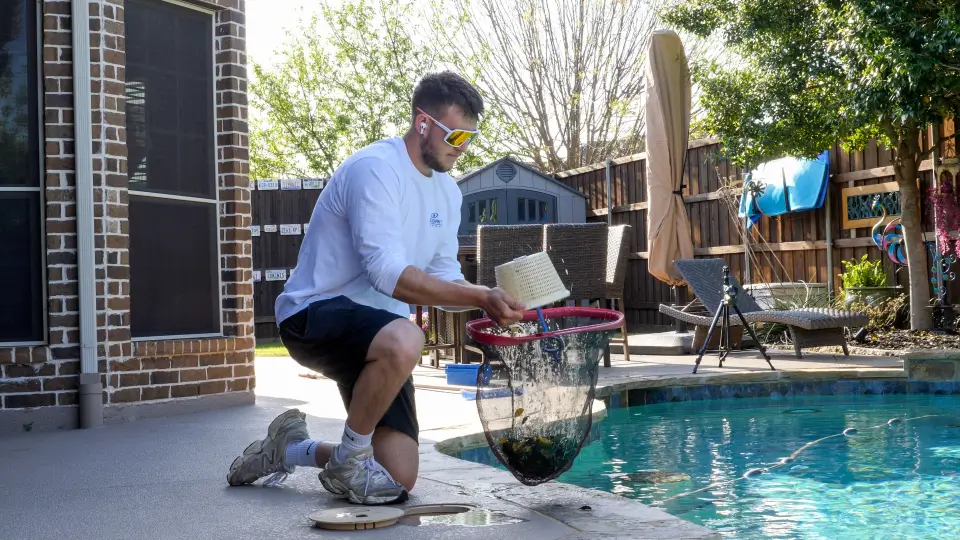
North Texas storms can throw everything from leaves to hailstones into a pool. Heavy rain often leaves behind dirty water and improper water balance. Strong winds clog skimmer baskets and strain the filter system, while hail can damage pool walls, covers, or even equipment.
Storm Prep & Recovery:
- Clear skimmer basket and filtration system after high winds.
- Remove debris floating in pool water quickly.
- Test and rebalance water chemistry after heavy rain.
- Inspect pool covers, surfaces, and equipment for hail or storm damage.
Avoiding Cloudy Pool Water in Fall
Falling leaves may look harmless, but when they sit on the pool surface or floor, they encourage algae and bacteria growth. Fall maintenance should focus on clearing debris, cleaning pool walls, and keeping the filter free of clogs. You don’t typically need to add as much chlorine during cooler weather, but checking regularly for proper chemical balance is still important for clear, safe water.
Fall Maintenance:
- Skim leaves and debris from the pool’s surface and floor.
- Brush walls to prevent algae blooms from decaying leaves.
- Keep filtration system clean to handle falling debris.
- Maintain proper pool chemistry even with reduced chlorine demand.
Getting Ready for Lower Temperatures in Winter
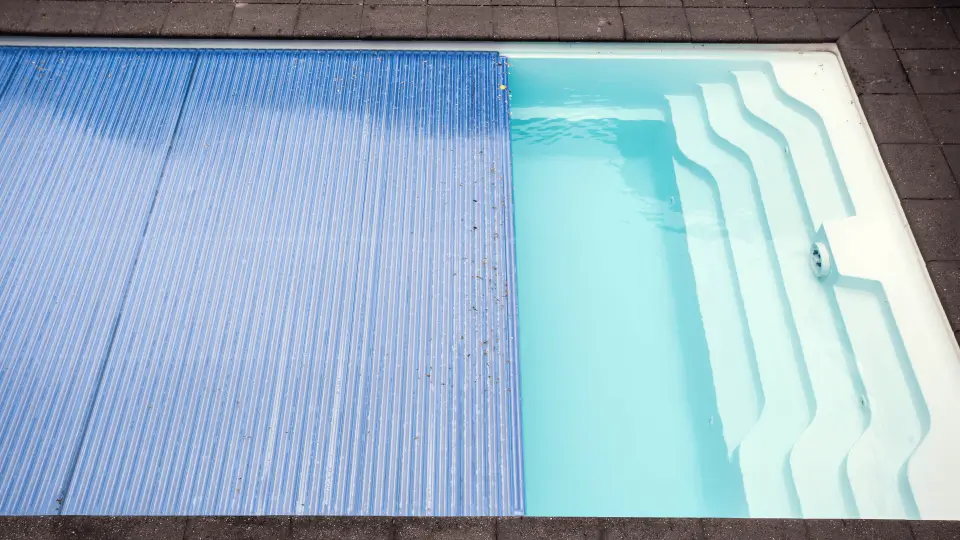
As temperatures drop, pool pumps can be run less often, but water circulation must continue to prevent cloudy water and algae. For winter pool maintenance, at least some daily circulation is needed to protect your pool system and keep your pool safe.
Winter Prep:
- Reduce pump run time but maintain daily water circulation.
- Adjust schedule to keep water moving at least a few hours each day.
- Continue monitoring chemical balance, even in cooler months.
Protecting Equipment & Using a Cover During Winter
Winters in North Texas can range from mild to freezing. Freezes put pool equipment at risk, so it’s important to protect the pump, pool filter, and pipes. Using a pool cover or winter cover helps block debris and keep water clean. Even in colder months, chlorine levels should stay within the ideal range to prevent algae growth and dirty water.
Winter Maintenance:
- Protect pump, pool filter, and pipes during freezes.
- Use a pool cover or winter cover to block debris.
- Keep chlorine and water balance in the ideal range.
- Inspect equipment periodically to prevent costly repairs.
Download Our Full Seasonal Pool Maintenance Guide
Want a full list of all the maintenance tips we shared for each season? Click here to download a PDF you can print or save for quick references and safe keeping.
Above vs. In-Ground Pools in North Texas
Both above ground pools and in-ground pools face challenges in North Texas. Above ground pools often require more attention to pool walls and covers, while in-ground pools depend heavily on the pump and filtration system. Regardless of type, weekly maintenance and seasonal prep is necessary to keep water clear and the pool system operating smoothly.
Common Problems Without Seasonal Maintenance
Neglected pools often face algae buildup, cloudy water, and unsafe bacteria growth. Improper water balance and poor circulation put stress on your pump and filter system, leading to expensive repairs. Over time, surfaces deteriorate, equipment malfunctions increase, and property value can decline.
Seasonal pool care protects your investment, keeps your pool clean, and ensures it remains safe and enjoyable year-round. At Integrity Pools, we know how to anticipate North Texas conditions and prevent these problems before they start.
DIY Maintenance vs. Professional Service
A good maintenance schedule includes skimming daily, brushing and vacuuming weekly, and testing pool chemical levels at least twice a week. But while homeowners can typically handle most of the routine cleaning, our weekly pool cleaning service ensures nothing is overlooked. We manage chemical balance, filtration, and system checks so you can enjoy your pool without worrying about water quality or safety.
Why Choose Integrity Pools for North Texas Pool Care
We specialize in keeping pools sparkling clean through every season. Our team knows how to handle weather-specific issues like hail damage, algae during high heat, and freeze protection for pool equipment.
We provide professional maintenance services, including weekly pool cleaning, leak detection services, pool equipment repair, and pool filter cleaning. Our goal with routine maintenance is to help keep your pool clean and avoid expensive repairs with regular, professional checks.
Bring in the Experts
Call Integrity Pools Today
Routine maintenance is the key to a pool that’s always ready to enjoy. Let our team at Integrity Pools handle the details so you can relax. Contact us today to schedule professional pool maintenance service in North Texas and keep your pool clear year-round.
